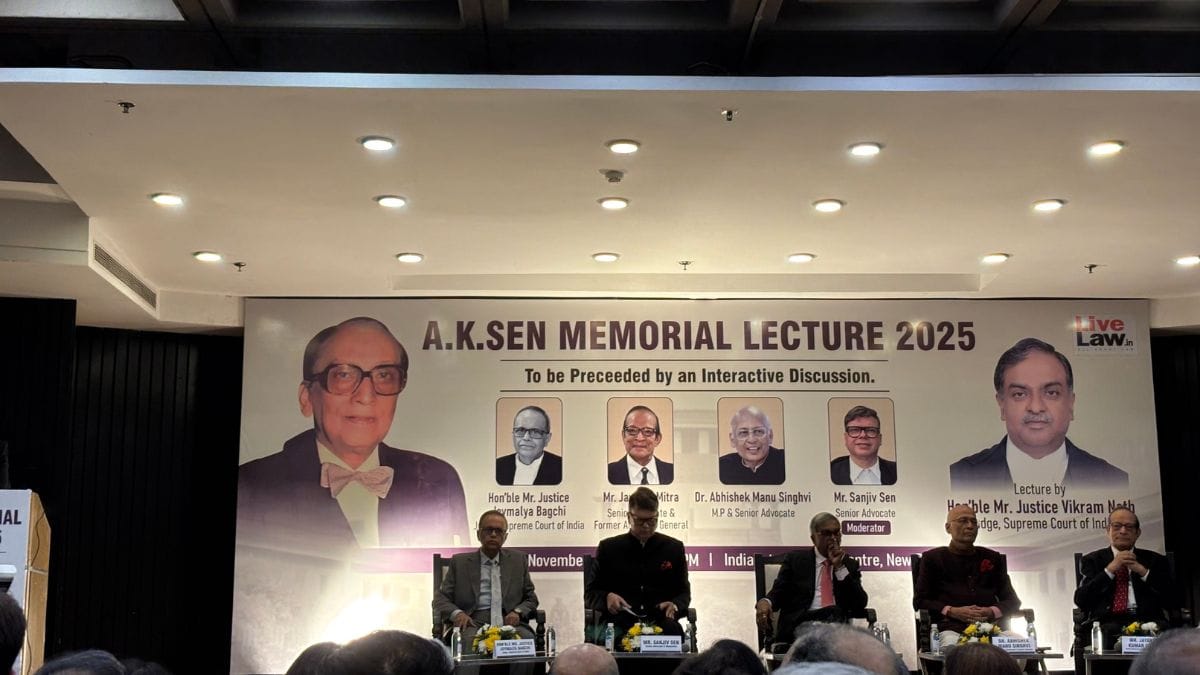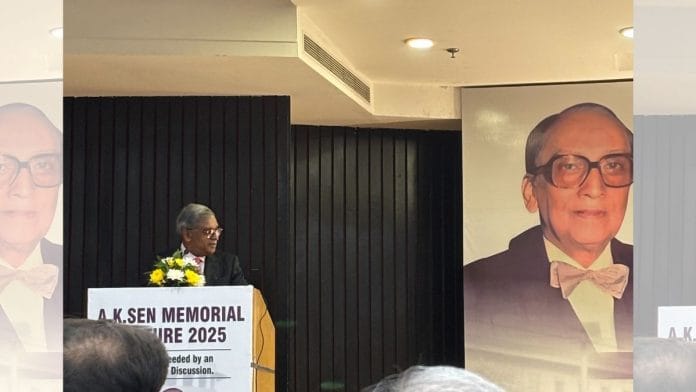New Delhi: Simple habits shape a lawyer’s reputation, Supreme Court judge Justice Vikram Nath said Friday while pointing out that consistent acts of discipline determine success in the profession.
“Make the law clearer, make the system calmer and bring people together around practical answers,” the judge said, recalling the principles that drove the longest-serving law minister in India’s history, the late A.K. Sen, as he addressed a gathering of judges, lawyers, law students, and media persons among others, at the A.K. Sen Memorial Lecture held at the India International Centre, New Delhi on 7 November.
Urging younger lawyers and law students in the audience to “do the simple things well”, Justice Nath in his address spoke of how those new to the profession must master the basics like being on time, reading the papers carefully, treating others in the courtroom with respect and giving due credit to those who helped you win.
“When you lose, learn why. When you win, thank those who helped you. Find mentors who correct you. These small habits, repeated over years shape a lawyer’s reputation and character, which is what eventually persuades courts and clients to entrust you with difficult work,” Justice Nath told the audience. He also added that trust is the currency of law.

Underlining that judges, too, can take a page out of the late A.K. Sen’s handbook, Nath said Sen dealt with disagreement without raising his voice, and was open to hearing every concern, without letting debate become a cause for delay.
Emphasising that clarity is a form of respect, Justice Nath said, “We on the bench should hold ourselves to the same measure. Clear reasons, a steady tone and decisions that ordinary people can read and follow.”
“Some of us wear only one role at a time, and one role almost always cancels out the other. But he was different. The teacher in him never left the lawyer and the lawyer in him never left the minister,” Justice Nath said recalling the many roles of the late barrister.
Pointing out that greatness in public life is not measured by tenure alone, but instead by a certain consistency of purpose, he said: “Length of service counts, but what counts more is the direction of that service,” he said.
Saying that reading is a public act, Justice Nath went on to add that the habit of reading was very dear to the late A.K. Sen. “In the legal profession, reading is often discussed in utilitarian terms. Read to win the case, read to master the brief, read to prepare the speech. But Ashok Kumar Sen’s example encourages a larger view, when a lawyer reads well, the judge reasons better. When a judge reasons better, a citizen lives better,” Justice Nath said while adding that if lawmakers read, laws become wiser as they are more rooted in a more generous idea of human possibility.
“Many of us grew up in homes where a single shelf of books carried great weight”, Nath said, adding that Sen had a “much larger collection”, full of rare volumes and careful notes.
Parliamentarian and senior advocate Dr Abhishek Manu Singhvi, Supreme Court judge Joymalya Bagchi, and senior advocates, Sanjiv Sen and Jayanta Mitra also spoke at the event.
Justice Joymalya Bagchi recalled the early days of practising in the Calcutta High Court. Once, a procession on the way to the HC delayed proceedings. “The judge told me to take an adjournment until some worthy senior came. Our blood pressures were rising. But suddenly, Sen’s clerk came and whispered something in the solicitor’s ears, causing him to glow up like an electric bulb and remark ‘Mr Sen will come’.”
When someone asked how, the clerk said Sen had decided to get off the car and was walking to the court. “A man who had nothing to prove to anyone, at the ripe age of 77-78, walked all the way to the high court, and with his guidance, we obtained an injunction,” Justice Bagchi said.
Senior advocate and parliamentarian, Dr Abhishek Manu Singhvi, reminisced how his father and A.K. Sen knew each other well and often competed in the SCBA elections, “They fought six elections of the Supreme Court Bar Council Association together. My father won four, A.K. Sen won two. And he swore to my father that each time, he always voted for him (L.M. Singhvi).”
Singvi also recalled A.K. Sen’s passion in life for law, and ‘singhara’ which is Bengali for ‘samosa’, a fried, triangular, savoury pastry fried in ghee or oil, containing vegetables or meat. “Today in SCBA meetings, samosas are served regularly,” Singvi said.
Senior Advocate Jayanta Mitra, who also served as the advocate general of Bengal, remembered how A.K. Sen was always guided by the motto: “Move on, move on, move on.”
(Edited by Viny Mishra)
Also read: Advocate Fali Nariman stood for what was right. Even at the risk of upsetting judges






